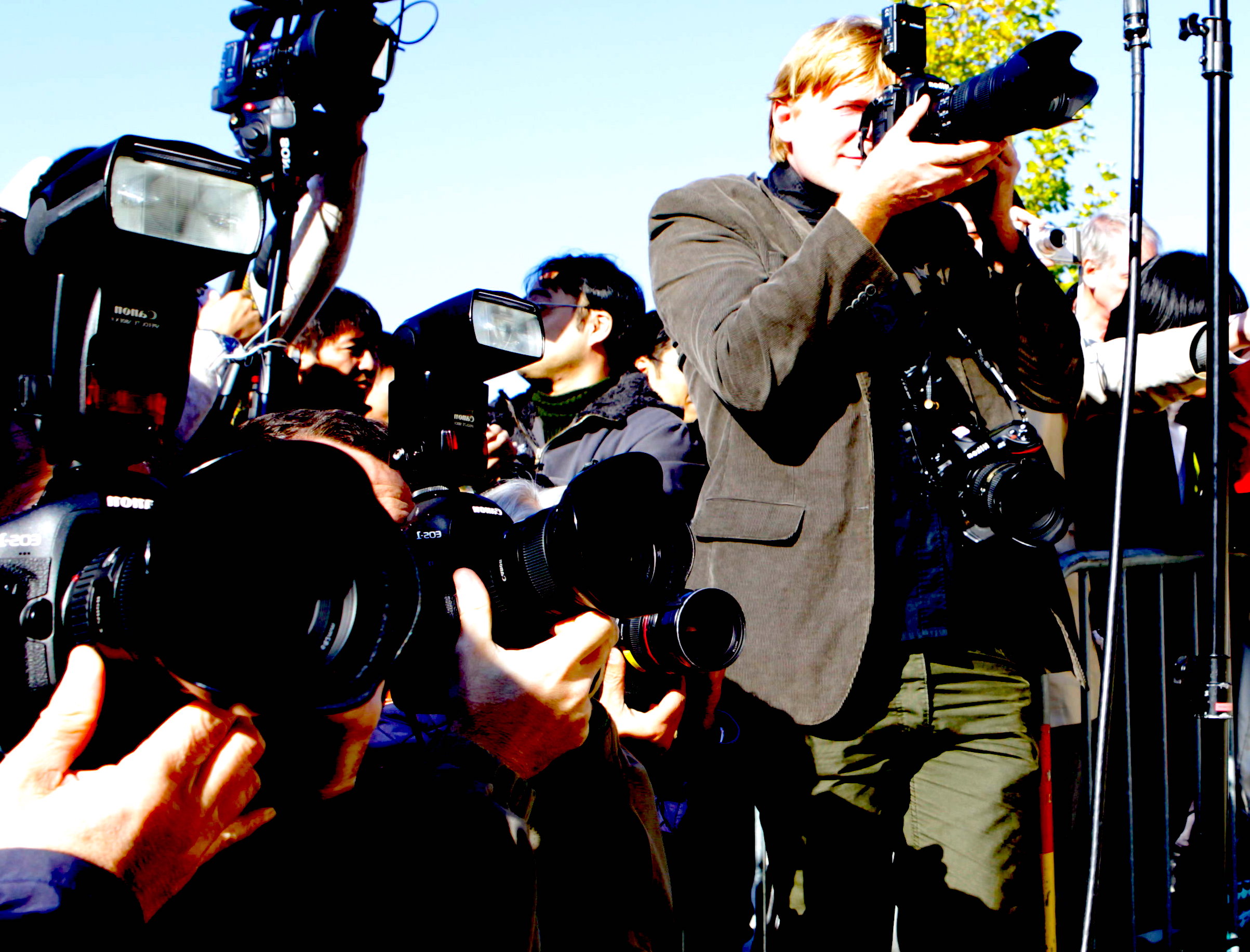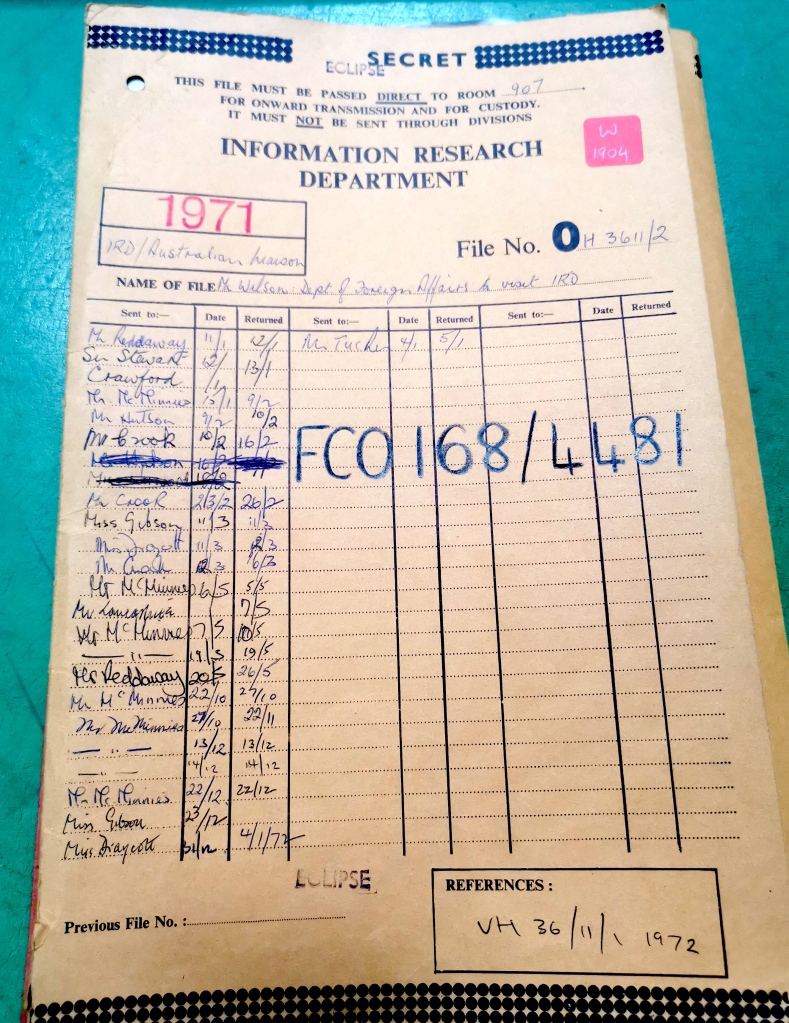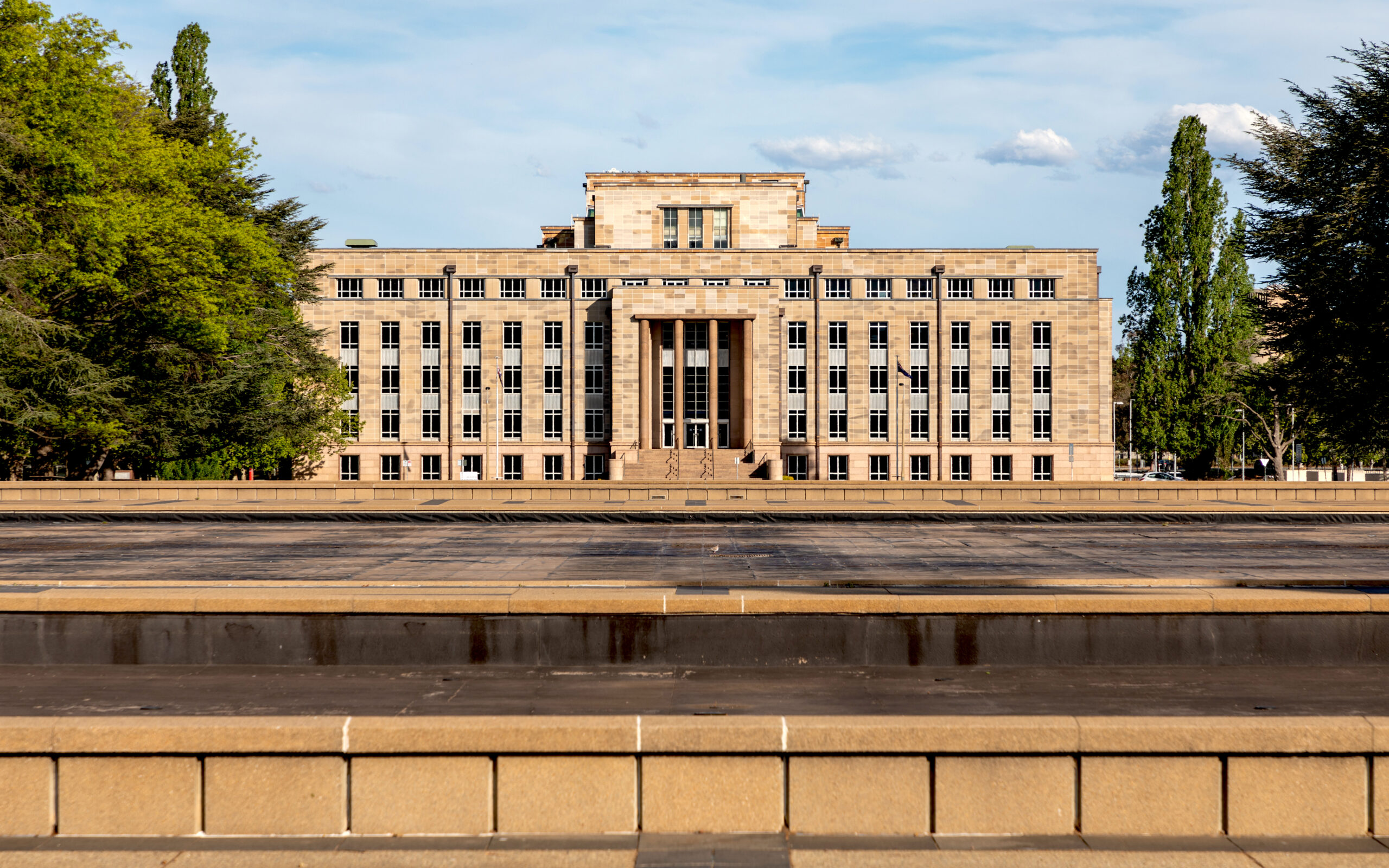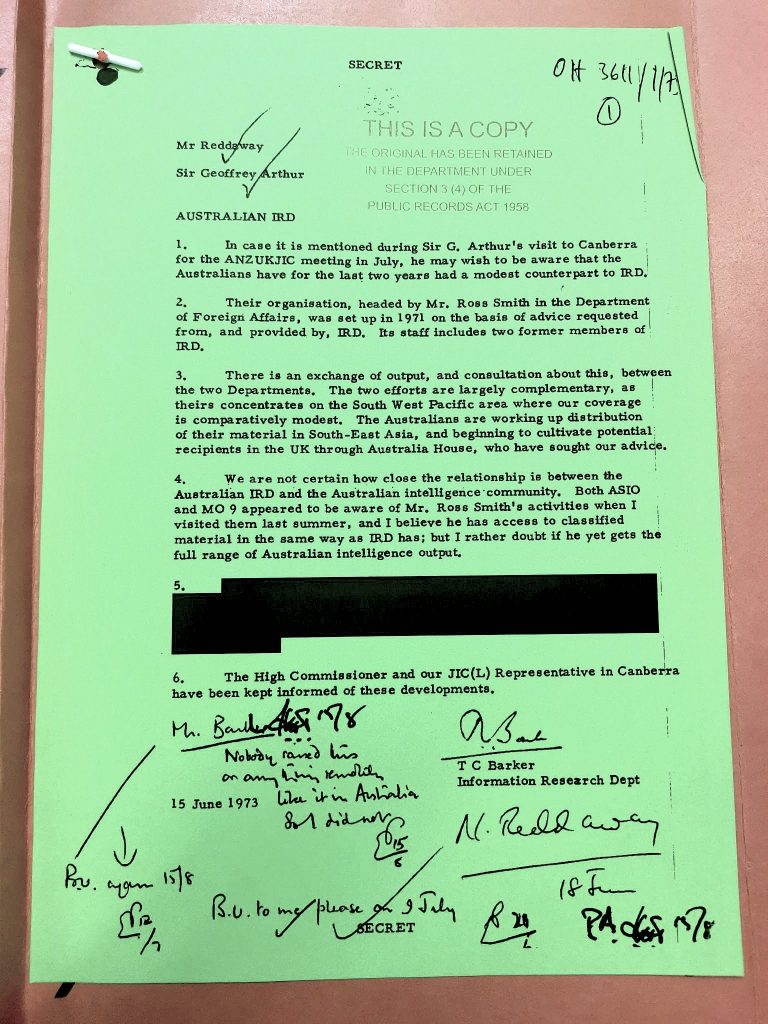Britain assisted Australia in setting up a team modeled on the U.K.’s notorious Information Research Department to run influence operations in the Asia-Pacific in the 1970s, John McEvoy and Peter Cronau report.

Journalists have been a main target of propaganda operations run by the British and Australian governments as part of a larger effort to shape events in the Asia-Pacific region. (US Mission Geneva, CC BY-ND 2.0)
By John McEvoy and Peter Cronau
Declassified Australia

 In the early 1970s, officials from Australia’s Department of Foreign Affairs (DFA) visited Britain for propaganda training. This culminated in the creation of an Australian propaganda unit in 1971, whose operations were focused on preserving Western power across Asia.
In the early 1970s, officials from Australia’s Department of Foreign Affairs (DFA) visited Britain for propaganda training. This culminated in the creation of an Australian propaganda unit in 1971, whose operations were focused on preserving Western power across Asia.
The unit was modelled on the Information Research Department (IRD), which was Britain’s covert Cold War propaganda arm between 1948 and 1977. It was also staffed with two former IRD officials.
The IRD covertly collected and disseminated material to the media to discredit human rights figures, undermine political opponents overseas, help overthrow governments, and promote U.K. influence and commercial interests around the world.
Details of Australia’s propaganda unit have remained secret until revealed in newly declassified U.K. Foreign Office files, and shine a renewed light on Anglo-Australian security co-operation during the Cold War.
‘Off With It Like a Racehorse’
In late 1970, U.K. Foreign Office official Norman Reddaway visited Canberra for a Four Power Information Meeting on defence and security strategy in South-East Asia, involving Britain, Australia, New Zealand and the U.S.
Reddaway was a seasoned British propagandist. After serving in the Second World War, he joined the Foreign Office and played a key role in setting up the IRD. In the 1960s, he was assigned as the “coordinator of political warfare” in Indonesia, where Britain was inciting massacres in its effort to overthrow President Sukarno.
By 1970, Reddaway was concerned about a “diminution of British interest” in Asia. Two years earlier, the Harold Wilson government had announced the withdrawal of British troops from major military bases in South East Asia, notably Singapore and Malaysia. Meanwhile, the IRD was undergoing a structural reorganization and facing funding and staff losses.
Reddaway thus wanted to plug a gap of declining Western influence in the Asia-Pacific, and recommended that Australia boost its propaganda effort in the region.

Recently declassified, this “Secret” file revealed for the first time that Australia had set up a propaganda unit in the Foreign Affairs Department, modeled on the U.K.’s Information Research Department, to run “information operations” spoon-feeding journalists with material designed to influence events in the Western Pacific and South East Asian region. (U.K. National Archives)
In Canberra, Reddaway asked the Australian foreign affairs chief Keith Waller whether Australia “should contemplate doing some information policy work” of its own — “information policy” being a gentleman’s euphemism for “covert propaganda.” He proposed that Australia “send someone to London to look at the work and functions” of the IRD.
In February 1971, the head of the information and cultural affairs branch of DFA, Michael Wilson, was dispatched from Canberra to the U.K. for two weeks. In London, he held “several long talks” with IRD officials about “setting up an IRD organisation for Australia.”
He was also given “a comprehensive picture of IRD’s present structure, the work of Asia and editorial sections, and IRD activities in SE Asia.”
Wilson was impressed by “the bipartisan nature of the support for IRD” in Britain, as well as “the lack of any political controversy surrounding it.” In Australia, however, he expressed fears that a similar propaganda unit would be used domestically by rival Australian politicians.
In early 1971, in the face of the disastrous Vietnam war and a resurgent Labor Party, head of the Treasury Billy McMahon and Defence Minister Malcolm Fraser were plotters in an internal party coup against their sitting Liberal Party Prime Minister John Gorton, with McMahon emerging as the new prime minister.
“If we let Billy loose with an outfit like this,” Wilson told British IRD official K.R. Crook, “he’d be off with it like a racehorse, using it against Fraser and Gorton.” Crook privately noted: “One has an awful fear that he could be right!” (Indeed, the IRD was frequently used by the British government to produce propaganda against perceived domestic opponents).
Wilson returned home to Australia via Hong Kong, where he secretly met the U.K. regional information officer and “held several long talks on… setting up an IRD organisation for Australia.” The files note that the senior Australian diplomat in Hong Kong, Roy Barcham, was “not, repeat, not conscious of the purpose of Wilson’s visit to London.”
Whitehall noted after Wilson’s return, that the Australians were expected to set up “a very modest research-and-output section in the DFA to provide a supporting arm for their political interests, and influences, in South East Asia”.
‘Thieves Kitchen of CIA Stringers and Dubious Characters’
In May 1971, the head of the Department of Foreign Affairs, Keith Waller, informed Whitehall that Australia would “embark on a limited amount of information policy activity” — or propaganda — and said he was “interested in the possibility of recruiting a small number of IRD research and journalist staff.”

The original Department of Foreign Affairs building in Canberra, now known as the John Gorton Building, was the home of Australia’s secret propaganda unit targeting Western Pacific and South East Asian nations. The unit was revealed following declassification of documents from the U.K. National Archive. (Dietmar Rabich, CC BY-SA 4.0, Wikimedia Commons)
By October 1971, DFA official Noel Ross Smith was selected to be the principal research officer heading up the new secret propaganda unit. Ross Smith had been a journalist with the ABC and Sydney Morning Herald, before joining the Australian News and Information Bureau (ANIB) inside the Department of the Interior and later served in several Australian embassies.
Ross Smith had been Information Attaché in the Australian embassy in Djakarta from 1962 to 1965, providing contacts and information to Australian reporters and media outlets. His time there had coincided with the period IRD was very active in Indonesia producing propaganda designed to undermine left-leaning Sukarno.
In November 1971, Ross Smith visited the U.K. for a six-week attachment to the IRD, based in the Foreign Office at Whitehall in London. The purpose was for him “to learn as much as possible the detail of the [IRD] operations”, covering “projects, sources of information, contacts, production and distribution”.
Ross Smith was thus able to study “how IRD works as an all-purpose unattributable information arm.”
“As it is as much in our interest as in that of the Australians to get their organisation off the ground, we have given Ross Smith all the help we can,” wrote one IRD official, although details of some of the IRD’s covert operations were not handed over.
After his six-week attachment with the IRD, Ross Smith flew to Hong Kong, Bangkok and Singapore for additional guidance on Britain’s propaganda operations across Asia. In Bangkok, he met with British embassy official David McBain, senior Hong Kong Government Information Service journalist Peter Moss and Australian embassy press attaché Eric Sparke.
They met at the Foreign Correspondents Club at the Oriental Hotel, which McBain described in a file note as “that thieves kitchen of CIA stringers and other dubious characters.”
Australia’s Own Secret IRD
Australia’s propaganda unit commenced operations in late 1971, and was situated within the Political and Social Research Section (PSR) of the Department of Foreign Affairs (DFA).
In June 1973, IRD chief Thomas Barker wrote that “the Australians have for the last two years had a modest counterpart to IRD. Their organisation… was set up in 1971 on the basis of advice requested from, and provided by, IRD.” Its staff included “two former members of IRD.”
“There is an exchange of output, and consultation about this, between the two Departments,” Barker continued.

This document classified “Secret,” is a file note from the Information Research Department outlining their understanding of the Australian counterpart. Note that a paragraph is redacted, still being kept secret after 49 years. (U.K. National Archives)
“The two efforts are largely complementary, as theirs concentrate on the South West Pacific area where our coverage is comparatively modest. The Australians are working up distribution of their material in South-East Asia, and beginning to cultivate potential recipients in the U.K. through Australia House, who have sought our advice.”
With the Australian propaganda unit modelled on the IRD, the “material” distributed would likely have been unattributed research briefs and articles written for newspapers and journals, and the “potential recipients” would have been cooperative journalists writing on the region.
According to Barker, ASIO, the Australian Security Intelligence Organisation and ASIS, the Australian Secret Intelligence Service, “appeared to be aware of Mr Ross Smith’s activities…, and I believe [the unit] has access to classified material in the same way as IRD has; but I rather doubt if he yet gets the full range of Australian intelligence output.”
Familiar Model
The unit was in operation for at least three years and it remains unclear from the files when it was eventually shut down.
In October 1974, the British embassy in Canberra reported that Ross Smith had “left the Political and Social Research Section” to take up a position as consul-general in Lae, Papua New Guinea, as the Australian territory prepared for independence in 1975.
Ross Smith later went on to serve as Australia’s high commissioner to Nauru and Malta and is now deceased.
After Ross Smith’s departure from the secret unit, the British embassy in Australia asked that future correspondence from the IRD be addressed to Australian DFA official, Richard Butler, who was at the time acting head of the PSR.
Butler told Declassified he had been appointed to the PSR section in 1974 by the department’s then Head of Public Affairs Richard Woolcott, who later served as Australia’s ambassador to Indonesia during its brutal invasion of East Timor in 1975.

Noel Ross Smith, head of the covert propaganda unit in the Dept of Foreign Affairs, from 1971-74; Richard Butler, head of the Political & Social Research Section from 1974-75 that held the propaganda unit; Richard Woolcott, head of the Public Affairs & Cultural Relations Branch, in the Dept of Foreign Affairs, from 1971-75. (Dept Foreign Affairs and Trade)
Butler said he had been briefed by Woolcott to prepare press materials explaining the government position on East Timor both for other diplomats and for the domestic public. Australia supported Jakarta’s invasion and occupation of East Timor, during which over 180,000 people were killed.
Woolcott, now aged 95, told Declassified he could not recall the unit nor any contact with IRD.
Butler said his work in the Political and Social Research Section (PSR) of Foreign Affairs was usual public information work, focusing on explaining Australian government policy to the public. While he knew of Ross Smith, he says he was unaware of his precise role and hadn’t known about an IRD counterpart in Australia.
While it seems the IRD and its Australian counterpart in the PSR are no more, the role of propaganda in persuading and massaging the public’s perceptions of foreign policy continues.
In Australia, the Defence Force’s psychological operations unit, and in the U.K. the army’s psychological warfare unit of the 77th Brigade, are just two of the propaganda outfits exposed in recent years running information operations on the domestic public.
The newly released U.K. files help fill in the gaps in our understanding of the growth of propaganda and disinformation. Australian files on IRD and the PSR unit remain classified.
John McEvoy is an independent journalist who has written for International History Review, The Canary, Tribune Magazine, Jacobin, Brasil Wire and Declassified UK.
Peter Cronau is co-founder of Declassified Australia, and is a multi-award winning investigative journalist, writer and film-maker. He is co-editor of the recent book A Secret Australia – Revealed by the WikiLeaks Exposés.
This article is from Declassified Australia.

From the article: “Ross Smith was thus able to study ‘how IRD works as an all-purpose unattributable information arm.’”
Who knew, before propaganda came along, that “reality” was so malleable? Spreading information “unattributable” by design — either because it would be disbelieved if its source were revealed, or because it was wholly fabricated — creates an “unreality” with the appearance and apparent credibility of reality . . . as long as it’s not examined too closely. How many “journalists” have lent themselves to so dubious an attempt to mislead the public?
This is an excellent article that should be of no surprise. The Brits have over 300 years of experience at playing head games and spying on other Countries. This article should of referenced a
Aussie named Ted Serong. He was the top Aussie co opted CIA guy in Vietnam for over 30 years and a bio about him was titled I think: To the Bitter End. He was involved in it all from beginning to end. His superior in the Foreign Office would say: Ted just buy us a few more years, no matter what it takes.
In an actual democracy, there can be no such thing as a ‘Secret Propaganda Unit.’
Perhaps it seems normal in this crazy, Orwellian age. But the very notion turns the entire idea of ‘democracy’ on its head.
The very idea of ‘government propaganda’ is contrary and destructive to democracy. The two can not exist together.
Democracy means the power of the state rests in the hands of the people. But, in order to make democratic decisions about the direction of their state, they need to know the truth about what is going on. A government that produces propaganda has committed a coup-de-etat against democracy, as it is now the government that has grabbed the power away from the hands of the people, and then in the future uses this propaganda power to manipulate and control the democracy.
In a world of government propaganda, all the citizens are allowed to do is to choose the hair-styles of the rulers. In the blizzard of lies, they can not be exercising democracy. After all, they can not believe anything the government says, nor can they believe any candidates …. so the ‘issues’ of the campaign are all just lies blowing in the wind and will be ignored as soon as the election results are computed and announced.
If you see a government propaganda unit, especially a secret one that the public does not even know about, then you are not looking at a democracy.
How precious, people still think they’re in a republic when they’re transparently autocratic totalitarian corporatists.
I don’t think we have any say about the hair styles of the rulers. There would’ve been hell of a toupee if a stylist got close to Trump’s hair.
I find the timing interesting. …. Did not the British Crown overthrow a slightly left-of-center, democratically elected Australian government not too very long after this story finishes?
We have seen a world that has marched steadily to the right for at least half a century. And during that time, when the citizens have tried to turn left, there are a series of assassinations, coups and crooked elections, with a steady trail of bread crumbs leading back to the Anglo Deep State. And this is how the world was led to a point where once again soldiers are retrieving copies of ‘Mein Kampf’ from captured bunkers, and where today’s rulers of the world appear to regard its author as a failed lefty (relative to them) who made too many mistakes.
It is neither an accident, nor actual democracy, that has led us to the world today, with the Doomsday clock using its new voice feature to say “10 … 9 …”
Australia’s not so secret propaganda unit is now called the ABC.
The 1000-piece puzzles are coming together (Nice Work) the artwork is taking shape, not exactly the sound of music pictorials that you would hope for, I can understand better why vague cut off his ear, to silence these devils.
Great
This article is far from reality. It grossly overstates the work of this half handful of people. I had not been aware that Michael and Ross journeyed to London and I think they would laugh at the pompous view of UK officials of their own work. The notion of what Ross was supposed to do was a tiny and ineffectual effort by a foreign ministry to make a little grab for some of the work of an information bureau mainly taking photos and writing stories about foreign students happily in Australia at a time when our image was still badly smeared by a racist immigration policy.
It is the normal work of embassies to provide information on their countries to local media as well as government.
Consortium News serves a valuable purpose but in this case I have to suggest that clutched straws do not make exotic cocktails.
Liberen al Mártir de la Libertad de expresión Julian Assange.
And what other country belongs to the ‘Asses of Evil’ club – besides the US and the UK???
“U.K.’s notorious Information Research Department to run influence operations” throughout Western Europe and beyond from the 1940’s onwards through various metamorphoses.